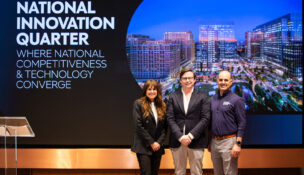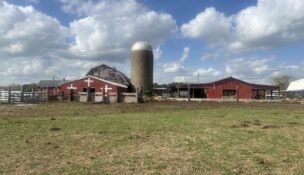125th anniversary
Woods Rogers maintains core values while moving into new fields
125th anniversary
Woods Rogers maintains core values while moving into new fields
As Roanoke-based law firm Woods Rogers marks its 125th anniversary this year, it can lay claim to being engaged in 21st-century legal areas such as cybersecurity while remaining firmly rooted in the traditions and principles of its founders.
“We’ve seen depressions, wars, peace and prosperity. We’ve seen it all, and yet the firm was able to not only persevere but thrive in whatever environment,” says Daniel C. Summerlin III, the firm’s president.
That perseverance, he says, was the result of generations adhering to a trio of core beliefs: producing high-quality work, hiring talented staff, and encouraging community involvement and public service.
Today, Woods Rogers is the ninth-largest firm in Virginia, employing 78 attorneys in offices in Roanoke, Charlottesville, Lynchburg and Richmond. Six of its attorneys have served as Virginia Bar Association presidents. Notable past partners at the firm have included U.S. District Judge Michael F. Urbanski and the late U.S. Rep. M. Caldwell Butler (a key Republican proponent for impeaching President Nixon in the 1970s).
Recognized by Corporate Counsel magazine for providing “exceptional work” to Fortune 500 in-house legal departments, Woods Rogers is also nationally known for its labor and employment and litigation practices.
Before shortening its name to Woods Rogers in 2003, the firm was known as Woods, Rogers & Hazlegrove. In 2016 Woods Rogers merged with Lynchburg law firm Edmunds & Williams.
‘The Colonel’
Woods Rogers traces its origins to the law practice co-founded in 1893 by Col. James P. Woods Sr., a Roanoke mayor and two-term congressman who died in 1948 at age 80.
“Over the course of history his legend has grown in stature, and I’m not sure which of the stories are true and which aren’t,” Summerlin says with a chuckle, noting that the firm owns portraits of “the Colonel” as well as his riding boots and sword.
James W. Jennings Jr., a trial lawyer who joined the firm in 1973, played tennis with Woods’ now-deceased son, a local school principal.
According to firm folklore, he says, Woods was given the honorary title of colonel of the Virginia militia by Gov. Claude Swanson.
Woods was said to be a “large individual, an imposing figure, a very dynamic personality and an outstanding lawyer, very active in the Democratic Party and the local community,” Jennings says. “He continued to wear frock coats well into the ’30s and ’40s.”
Former fighter pilot
As for the “Rogers” in Woods Rogers, that came from Frank W. Rogers Sr., a World War I fighter pilot and former University of Virginia rector who died in 1982 at age 89. The firm became Woods Rogers Muse & Walker in 1920. A former president of the Virginia Bar Association, Rogers also served as a president of the Roanoke Bar Association, which he co-founded in 1925. His son, Frank W. “Bo” Rogers Jr., who died in 2005 at age 76, was also a distinguished lawyer who practiced at Woods Rogers for more than 50 years. And Rogers’ grandson, Frank W. Rogers III, is a judge for the Roanoke County Juvenile and Domestic Relations District Court.
The senior Rogers’ greatest professional fame came in 1960 when the Virginia Bar Association sent him to the Soviet Union to represent the interests of the family of captured U.S. U-2 spy plane pilot and Virginia native Francis Gary Powers. Rogers and a Richmond attorney submitted an unsuccessful petition of clemency on Powers’ behalf to the Soviet government. The Soviets convicted Powers on espionage charges before freeing him two years later during a tense and much-publicized prisoner swap on a bridge in Berlin during the height of the Cold War.
“There was a lot written about it at the time, but there wasn’t much [Rogers] could do except show the flag,” recalls Talfourd H. Kemper. The firm’s most senior attorney, Kemper was hired by Rogers in 1965: “I was lawyer No. 11 at that time.”
Frank Rogers Sr. was “very demanding of himself and others, and he was very smart and articulate. I don’t know of another lawyer that could write more concisely and clearly than Frank Rogers,” Kemper says.
Jennings, who was also hired by Rogers, says that Rogers was “the driving force in generating the modern Woods Rogers after Col. Woods died … He had the vision for this firm of what it ought to be and how it should be comprised and how it should be run. And we were constantly reminded of that any time we encountered him.”
19 practice groups
Woods Rogers now has 19 major practice groups, including Business and Corporate Law, Cybersecurity, Intellectual Property, Labor and Employment Law, Litigation, Tax, and Trusts and Estates.
And the firm continues evolving to meet new business and economic demands, as evidenced by its new Emerging Growth practice, which is focused on providing new and fast-growth companies with an array of interdisciplinary legal services.
“We really try to cover all the areas where startups and growing companies could have needs,” says Eric J. “Rick” Sorenson Jr., who heads the firm’s Lynchburg office.
The new practice group is heavily driven by firms connected to Virginia Tech, the University of Virginia and Liberty University. It has assisted companies in industries ranging from biotech to fiber optics to renewable energy and brewing. It is equipped, Sorenson says, to assist companies along the entire corporate lifespan, working on issues ranging from corporate formation to seeking venture capital and financing to protecting intellectual property and merging with other companies.
Emerging growth and cybersecurity “have been the two growth areas in the last year that have allowed us to be on the forefront of the new economy,” Summerlin says.
Yet as Wood Rogers continues toward its 150th anniversary, it remains steeped in the traditions that have brought it this far.
“We strive to provide service to our clients in a prompt, professional and pleasant way, and a competent way,” says Kemper. “We’ve spent a lot of time over the years trying to adhere to those principles.”
i


















